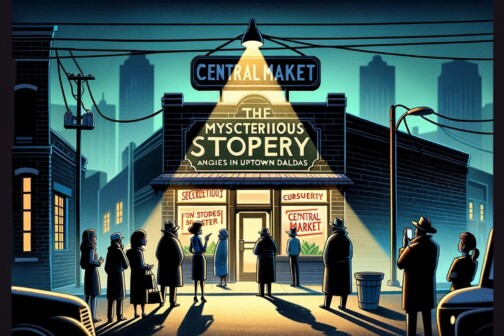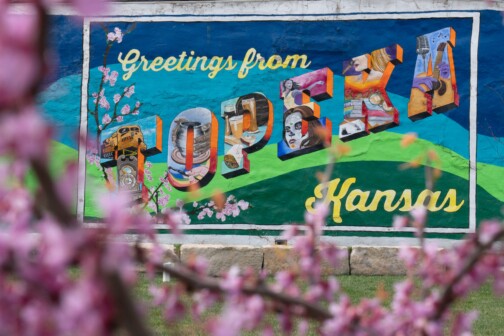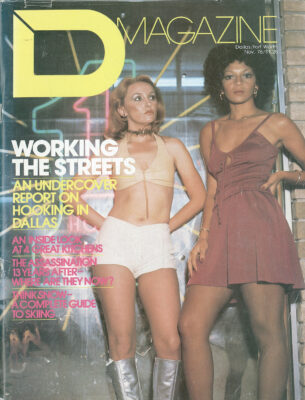Street Shooter
If you admired Doug Tom-linson’s photographs of Dallas buildings at the recent Dallas from the Ground Up exhibition at the Dallas Museum of Fine Arts, you may also have wondered how a photographer goes about getting such spectacular architectural shots. Now you have a chance to learn from Tomlinson himself, when he teaches a course at the Texas Center for Photographic Studies, beginning November 8. The three-week, 30-hour course costs $60, and includes field trips to the photographic sites.
Texas Center for Photographic Studies, 12700 Park Central Place, Suite 105/387-1900.
Buyer’s Market
Taking their cue from a similar enterprise in Atlanta, Michael Cao-lo, Jr., Mark Caolo, and Sherry Noe have transformed the 80,000 square feet of an old discount store into an indoor marketplace – the Big Flea Bazaar. When it opens November 5, there will be stalls offering merchandise from antique music boxes to waterbeds, from African art to comic books. It will be open only on Fridays and Saturdays from noon to 9 p.m. and on Sundays from noon to 7 p.m. These hours mean a low rent that skilled craftsmen can afford, and low overhead that keeps their prices from being out of sight. 3636 Buckner Blvd. (North of I-30)/328-6117.
Cutting Class
You don’t have to be a student to go to Skyline High School, the DISD’s innovative career development magnet school. Three days a week, the cosmetology cluster at Skyline is open to the public for cosmetic services – haircuts, facials, anything available in a beauty salon – at minuscule prices. The services are performed by senior students who will soon be qualifying for state licenses. They aren’t rank amateurs – some have already acquired followings -and they regularly provide service for senior citizens’ clubs. In the mornings, patrons must be at the salon by 8:45, in the afternoons by 1:15. Appointments are necessary. Cosmetology Cluster, Skyline High School, 7777 Forney Rd./388-2101.
Behind Clothes Doors
With a degree in design and 25 years in women’s fashion at a major department store, Anne Smoller practically defines the term, “fashion consultant.” She’ll examine your wardrobe and make suggestions about what you might need to update it, take notes on your likes and dislikes, the environment in which you work – or play – and advise you accordingly. Such a visit takes two or three hours, at $20 an hour, but it’s an educational experience. If you wish, she can then buy clothes for you. Since she keeps a notebook on your wardrobe, she’ll let you know if she finds a coordinating item. You decide whether to keep it. Her fee for this service is 5 percent of the price, but since she believes in keeping down expenditures, your output is low. Anne Smoller/661-1682.
KCHUtzpah
Lots of radio stations bill themselves as “alternative” radio, but only KCHU (90.9 FM) really deserves that title. It offers something for everyone – from talk shows about historic preservation to advice on nutrition to programming for the gay community. It also plays music, and one of its shows, the Jewish Music Hall, is unique in the state. Host Barry Somerstein grew up in Brooklyn and Philadelphia, and when he moved to Dallas and discovered there was no Jewish music programming, he decided to do it himself – writing the scripts, serving as host, and even being the engineer on the show, which is on the air every Sunday, 9 a.m. to noon. Somerstein plays Hebrew, Hassidic, cantorial and Yiddish music and offers a wealth of information on Jewish musical traditions.
A station membership is $25, and it puts you on their mailing list for the newsletter/calendar and entitles you to discounts from various local merchants. 2516 Maple Ave., Dallas 75201/742-6262.
The Last Pitcher Show
From milk to martinis, feathers to ferns, sarsaparilla to soap suds, pitchers vary to suit their contents. Once crudely made of clay, pitchers simply served a necessary function as water containers. With the passing of centuries and the introduction of running water into kitchens and bathrooms, pitchers have assumed more decorative functions. We have tried to present a sampling of a diverse category: the practical and the decorative, the appealing and the gracious.
A. Bicentennial Commemorative:
Commissioned by Lennox, “Patriot Pitcher” was created by Laszlo Ispanky A 200th anniversary memento for $98 from The Old World, 2800 Routh.
B. Little Pitchers: This seven-inch,pink and white bunny may be just the thing to encourage a toddler to drink his milk. $15.50 at the Old World, 2800 Routh. This delectable strawberry stands five inches tall and looks good enough to eat. $35 at The Pavilion / Marie Leavell, 147 Inwood Village.
C. Italian Elegance: This hand-blown Italian glass Taitu pitcher would graceany table. Ten inches high, it comes in both green and brown with matching glasses. $30 at Andy’s, 4105 Oak Lawr
D. Personalized Pitchers: Artist Robert Griffin will create your own design on these gallon and half-gallon pottery pitchers. $30 and $22.50 at Quadrangle Antiques, 2800 Routh.
E. Happy Hour: Be a hero to yourfriends as you serve perfect martinisfrom this foot-high, silver-crestedglass pitcher with its built-in icer.$100 at The Pavilion/Marie Leavell,147 Inwood Village.
F. Roughing It in Style: Who saidlife was barbaric until the invention ofrunning water? This 19th centuryEnglish ewer and basin made washingup an art. Eleven inches high with17-inch bowl, this antique is availablefor $135 at the Whatt Not Shop,3136 Routh.
G. Can’t Tell a Zebra by His Stripes: This imposing zebra head doubles as a pitcher and a flower holder and comes in two sizes; 12-inch for $50, 9-inch for $20. At The Market, 4236 Oak Lawn.
-Megan Mastal
See You Later, Percolator
Americans consume two-thirds of the world coffee market, but far too often we settle for a brew that, if it has any flavor at all, tastes like boiled acorns. For some inexplicable reason, millions apparently believe that freeze-dried crystals indeed “taste just like fresh-perked.” The ads don’t specify what has been fresh-perked.
Speaking of percolators, tastes seem to be improving: the sudden popularity of automatic drip coffeemakers appears to have made the old mainstay, the percolator, a thing of the past. The new machines are convenient to use, and they make a better cup of coffee, because they don’t, as percolators do, violate a basic principle by passing first boiling water, then (horrors!) boiling coffee, over the grounds several times.
But don’t expect an excellent brew from a drip coffeemaker if you continue to use pre-ground coffee. Even when it’s vacuum-packed, coffee can’t stay fresh. If you’ve ever ground your own, you know that what it tastes like two weeks later is a far cry from its flavor just after you ground it, so you can’t expect coffee that’s been sitting on a shelf to taste very fresh, either.
Buying coffee beans, grinding them, and using a proper pot is, naturally, a far more expensive venture than stirring up a cup of instant, but it’s worth it. If you know what to look for, you can buy beans suitable for any taste. My own favorite, French Roast, which has been roasted until the bean is nearly black, is probably too strong for most coffee drinkers unless it’s been liberally laced with cream. More mellow brews, ideal for morning coffee, can be had from beans such as the Colombian and Kenyan varieties; and you can always blend beans to your own taste.
The variety of beans is nearly e-qualled by the variety of brewing methods. Espresso is one of the best, and as its name implies, one of the fastest as well. Espresso machines to be used at home range from a brass and copper collector’s item at the Coffee Company in the Quadrangle to less expensive single-cup machines to be used on the stove, available at most of the stores mentioned below.
An excellent coffee can be made using a drip pot. One of the easiest and least expensive is the cone brewer, of which Melitta is the most common brand. This type can also save on coffee since it can take fine grinds. The only problem with these is that, compared to automatic drip coffeemakers, they are messy and time-consuming.
The two-cylinder café filtré pot, turned upside down when the water boils, is not only slow but downright dangerous unless you’re used to it. If they’re not reversed quickly, the cylinders tend to separate; even so, water sprays out of the pinhole-sized opening, so it’s best to use this pot when no one else is in the kitchen.
With the proper beans and pot, it’s easy to make excellent coffee for any occasion. Cafe au lait, is, of course, a perfect morning coffee; to make it, use a dark roast and hot milk. Pour the coffee and milk into mugs simultaneously and equally. A close approximation of espresso can be made in any coffee maker by using a large amount of dark roast and serving with a twist of lemon; this type is best drunk only after meals unless you have an iron stomach.
Viennese coffee and cappuccino are two impressive after-dinner coffees. Cappuccino is made by blending two-thirds espresso and one-third hot milk, and topping with cinnamon or nutmeg.
A number of stores in Dallas carry everything you need; the place for both the novice and the connoisseur is the Coffee Company in the Quadrangle (748-1133). They carry about two dozen types of beans, all kinds of pots and grinders. A major advantage to buying beans here is that they never keep them longer than eight months, so freshness is assured. Per pound, the coffee here can be expensive, about $3.50 and up, but the price isn’t unreasonable if you want the best. Owner Patricia Brady and manager Nancy Stapp can guide you on selection, suggest blends, and choose the grind suitable for whatever coffee maker you use. This is the only place which carries drip thermoses for coffee, which are ideal for those who can’t tolerate the nearly-tasteless brew found in most office machines. The variety of pots here is the largest in town, and the shop has a number of demi-tasse cups, grinders, and containers as well.
Smaller in selection but equal in quality, the Nut House (6079 Forest Lane/661-5288) carries over a dozen varieties of beans, from a house blend to the fine Tanzanian Kilimanjaro. Coffee can be ground here to your specification; they also have a nifty French electric grinder for about $20, if you want to grind your own. The other location (6137 Berkshire, inside the Cheese House/361-7151) carries a number of varieties of beans as well.
Kuby’s (6601 Snider Plaza/363-2231) ranks next in terms of quantity; they carry eight or so types and a large number of Melitta pots. Prices here tend to be fairly inexpensive, about $3.29 per pound, but keep in mind that prices on the coffee market fluctuate constantly, and are usually increasing.
Al’s (8209 Park Lane/363-3778) is the cheapest at $2.79 a pound for each of the four types available there. If you have to have pre-ground coffee, go here, since the store stocks Jamaican, Turkish, and other types.
Antone’s (4234 Harry Hines/528-5291) carries pre-packaged beans in a number of kinds for $2.49 per 12 ounces, and even sells pure chicory for blending your own French Market-style coffee. Like the other stores, Antone’s has several types and brands of pots, including one-cup café filtré pots. – Gail Garvie
Get our weekly recap
Brings new meaning to the phrase Sunday Funday. No spam, ever.
Related Articles

Commercial Real Estate
The Mystery Ownership Behind That Planned Uptown Central Market
You'll never guess.
By Tim Rogers

Local News
Dallas Assistant City Manager Robert Perez Hired to Lead Topeka’s Government
Perez parlayed his two decades of municipal experience (including two years as assistant city Manager in Dallas) into the top spot in Topeka, Kansas, sources tell D.

Business
Executive Podcast Club: DFW C-Suiters Reveal Their Top Listens
Kim Butler, Chris Trowbridge, Fred Balda, and more share the one podcast they think everyone should listen to—and why.


